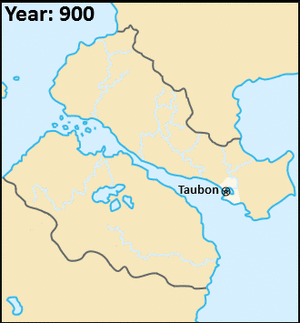History of Toubaze
The history of Toubaze
Chiefdom Period (900-1190)
Northern Expansion
Conquest of Skalana
Remembered as first 'real' war by Toubaze, other northern conquest was mostly strongarmed annexations and diplomatic or small conflicts. Skalana was first use of a real army in a real war, with real tactics and logistics, paved way for the Kingdom and expansion in the south.
Taubon Kingdom (1190-1404)
Southern Expansion
Nobles War (1404-1432)
Aftermath
Early Kingdom (1432-1602)
Years of Mourning
Plague and drought/famine. Similar impact to the Irish Famine, population drops and only gets back to the same levels in 1730.
Absolute Kingdom (1602-1873)
Strong rule of monarchs, peaked under the long reign
The Long Reign
Toubaze Victorian age under a long living monarch, also gets to modern borders
Constitutional Monarchy (1873-1942)
Democracy came to Toubaze after the 1873 Relsessit Revolt. The Constitution of the same year established a constitutional monarchy with a bicameral system, the upper house being the Estate Assembly and the lower house being the Popular Assembly. This was changed in 1897 with the removal of the Estate Assembly, mostly controlled by the former nobility and upper class, as well as an introduction of a proportional representation voting system. The new voting system lead to new parties entering the new, unicameral National Assembly in the next year's election. Women's suffrage was introduced in 1910 at the height of what is known as The Progressive Era, where many progressive initiatives were taken to uplift the lower classes of society by the government lad by the People's Party, a predecessor to the modern day party Progressive Alliance.
1915 Coup
In 1915, a coup lead by the military, backed by conservatives, the upper class and welcomed by King Enhala XVII marks the violent end of The Progressive Era. The new military leadership set out to rewrite the constitution to give back power to the upper classes. Following the coup in 1915, the new constitution backed by the military restored the upper house and changed the electoral threshold to 8%, doubling the previous 4% threshold among other changes aimed at making it harder for progressive and liberal elements to gain power. The Kingdom was onwards very unstable, and its bureaucracy was very inefficient and slow due to direct government approval needed for a majority of things. Combined with a stagnant economy due to slow action on part of the government when dealing with fiscal problems, helped anti-royalist movements to grow rapidly within the country. This all came to a head in 1942, also known as the Republican Revolution.
Republican Revolution
King Enhala XVII declared the 1942 election void as the conservative party for the first time became a minority and meant they could no longer keep hold of government control. This lead to mass protests, general strikes and riots all over Toubaze. It all culminated with pro-republican militia forces storming Taubon and declaring the Republic of Toubaze and an overthrow of the monarchy. Civil War was narrowly avoided as the military high command had been infiltrated by anti-royalists who sabotaged their ability to react as well as sympathies among the common soldiers for the Revolution. The Constitution of 1945, still being in effect today, reversed many of the changed made by the 1915 Constitution and established a unicameral system with the National Asssembly as part of a new unitary parliamentary republic, the Republic of Toubaze.
Republic of Toubaze
After the Revolution, the progressive government established, among other things, a social security system for all citizens. The decades immediately following the Revolution are often considered The Second Progressive Era. It is also during this period, in 1949, Toubaze became a signatory of the Ardgan Declaration. The 1950s saw large economic growth for Toubaze attributed to the economic policies of the Liberal Party at the time. The Progressive Alliance and Liberal Party would be fighting for the Prime Minister position for most of the 60s as the two largest parties.
The Great Recession
Triggered by rising inflation, trade tariffs and extensive government debt as well as other factors, the economy took a nosedive in 1977 and was saved from collapse by government intervention. The Election the same year was plagued by criticism of the government during the initial stages of the recession and the subsequent years saw a halt on many projects and a stagnation of the economy. Although by 1986 it was back on a positive growth.
The Grand Election
In 1990, the Grand Election took place. Often considered a turning point in modern Toubaze history it saw huge voter migrations as well as the amount of parties in the National Assembly doubling to eight. The new building for the National Assembly, The Palace of the Republic was also completed symbolizing a more physical change to the political scene as well.
Modern Day
Started in the 90’s, the Owir Bridge stands finished on August 5th 2001.
